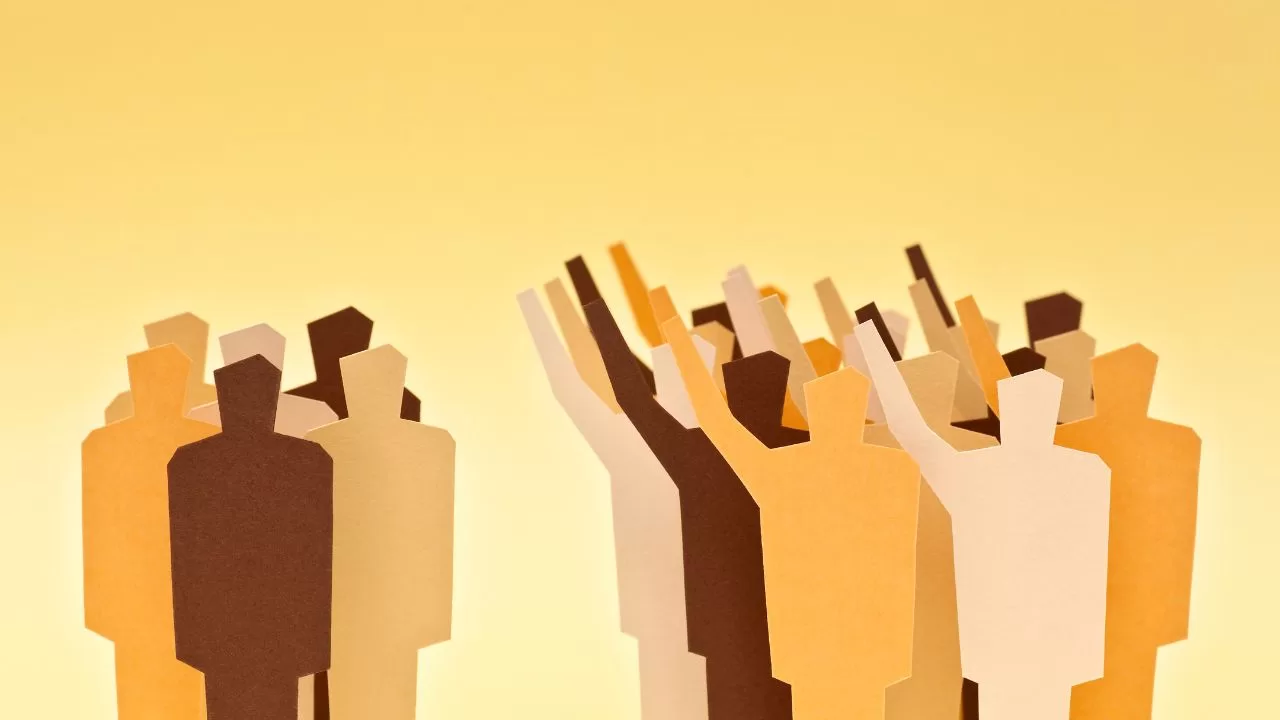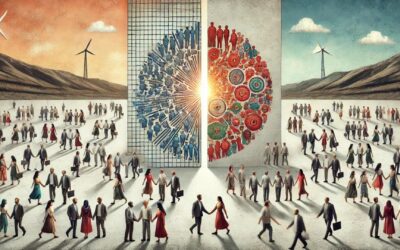On a crisp autumn evening, as the golden sun began its descent beyond the cityscape of Metropolisville, there was a gathering at the city’s renowned cultural center, “The Nexus.” People from different backgrounds, ethnicities, and religions came together, united by a common theme: the representation of minorities in Metropolisville’s democratic processes.
Jasmine, an ambitious young journalist, was assigned to cover the event. As she entered The Nexus, she was met with a whirlwind of colors, languages, and stories. Determined to grasp the core of the minority struggle, she decided to engage with three individuals: Carlos, an immigrant; Aisha, a second-generation Muslim woman; and Raven, a transgender activist.
Carlos: The Immigrant Story
Carlos, a middle-aged man with salt-and-pepper hair and a deep sense of pride, was a prominent figure in Metropolisville’s Hispanic community. He narrated his journey, explaining how he moved to the city seeking better opportunities but often found himself marginalized due to his immigrant status.
“In my homeland,” Carlos began, “I was a teacher. But here, I struggled to find a similar position because of my accent and origins. Even in a democracy like Metropolisville, where everyone should have equal rights, there are biases. It’s not just about voting—it’s about having our voices truly heard.”
Carlos emphasized the importance of immigrants in community development and how their diverse backgrounds bring innovative solutions. But the challenge remains: ensuring their rightful place in a democratic society.
Aisha: The Veil and The Vote
Aisha, in her early 30s, wore a hijab confidently. But her story was one of duality: pride in her identity and the constant need to prove her loyalty to Metropolisville.
“For many,” Aisha sighed, “my hijab is a barrier. They question whether someone like me, with my beliefs, can be a true citizen of this nation.”
Jasmine sensed Aisha’s frustration. The young woman went on, “While I can vote, true democracy means more than a ballot paper. It’s about acceptance, representation in leadership, and policies that cater to all, regardless of faith.”
Aisha’s story was a testament to how religious minorities often grapple with misconceptions, yearning for equal footing in society.
Raven: Beyond the Binary
Raven’s voice was one of the strongest in the LGBTQ+ community. With colorful tattoos and an indomitable spirit, she spoke about the transgender community’s unique struggle.
“Democracy isn’t just about majority rule,” Raven stated. “It’s about protecting the rights of the minority, too. And while Metropolisville has come far in terms of LGBTQ+ rights, the road ahead is long.”
For Raven and many like her, democracy’s promise was the hope that one day their identities would be universally accepted, granting them equal opportunities in every sphere of life.
The Synthesis: A Unified Voice
As the evening progressed, Jasmine realized that while each story was unique, there were shared threads: the desire for equal representation, acceptance, and the right to co-create a nation’s future.
Metropolisville, like many democracies worldwide, was a melting pot of cultures, beliefs, and histories. And while the principles of democracy promised equality for all, the lived reality for many minorities was different.
It was clear that for a democracy to be robust and truly representative, it needed to do more than grant voting rights. It needed to ensure every voice, no matter how faint, was heard. It required policies that recognized diversity as a strength, not a weakness. And it demanded leaders who, irrespective of their background, represented the collective dreams and aspirations of all citizens.
The gathering at The Nexus was more than just a cultural event—it was a symbol of the ongoing struggle of minorities in democracy. But it also represented hope. Because, as Carlos, Aisha, and Raven had shown, when stories are shared, barriers are broken, leading to understanding and, eventually, change.
Jasmine left The Nexus that night with a renewed sense of purpose. She penned an article, amplifying the voices she had heard, reminding Metropolisville and the world beyond of democracy’s true essence: a system where everyone, irrespective of their minority status, has an equal stake.
In conclusion, the journey of minorities in democratic systems worldwide is marked by both progress and challenges. The struggle for equal representation and rights is ongoing. But as gatherings like the one at The Nexus show, there is hope. Hope that with shared stories, understanding, and advocacy, democracies everywhere will one day fulfill their true promise: equality for all.
Keywords
- Metropolisville: A fictional city representing a diverse urban environment.
- The Nexus: A cultural center in Metropolisville where various communities gather.
- Marginalized: Treated as insignificant or peripheral.
- Hijab: A head covering worn in public by some Muslim women.
- Duality: An instance of opposition or contrast between two concepts or two aspects of something.
- Misconceptions: A view or opinion that is incorrect because based on faulty thinking or understanding.
- LGBTQ+: An acronym for Lesbian, Gay, Bisexual, Transgender, Queer/Questioning, with the plus sign representing other sexual orientations, identities, and genders.
- Indomitable: Impossible to subdue or defeat.
- Melting pot: A place where different peoples, styles, theories, etc., are mixed together.
- Amplifying: Increase the volume of (sound), especially using an amplifier.
Key Takeaways
- Minorities, whether they are immigrants, religious groups, or part of the LGBTQ+ community, often face challenges in democracies despite the promise of equal rights.
- True democracy is more than just voting; it involves genuine acceptance, equal representation in leadership, and inclusive policies.
- Each minority group, while having unique struggles, shares common threads of wanting acceptance and equal rights.
- A robust democracy recognizes the strength in diversity and ensures every voice is heard, regardless of its minority status.
- Sharing stories and experiences can lead to better understanding and foster change in how minorities are viewed and treated.
Articles on The Story of Democracy
Journey Through Democracy: Origins, Evolution, and The Path Forward (Featured Article)
Direct vs. Representative Democracy: Which Truly Reflects the People’s Will?
Democracy 2.0: How Technology is Reshaping Civic Participation
The Pulse of Democracy: Minorities Seeking Equal Rights and Representation
The Fragile Nature of Democracies: When Governance Takes a Dark Turn
The Power of Civic Learning: Shaping Democracy’s Future
Wealth & Freedom: How Economic Systems Shape Democracies












0 Comments